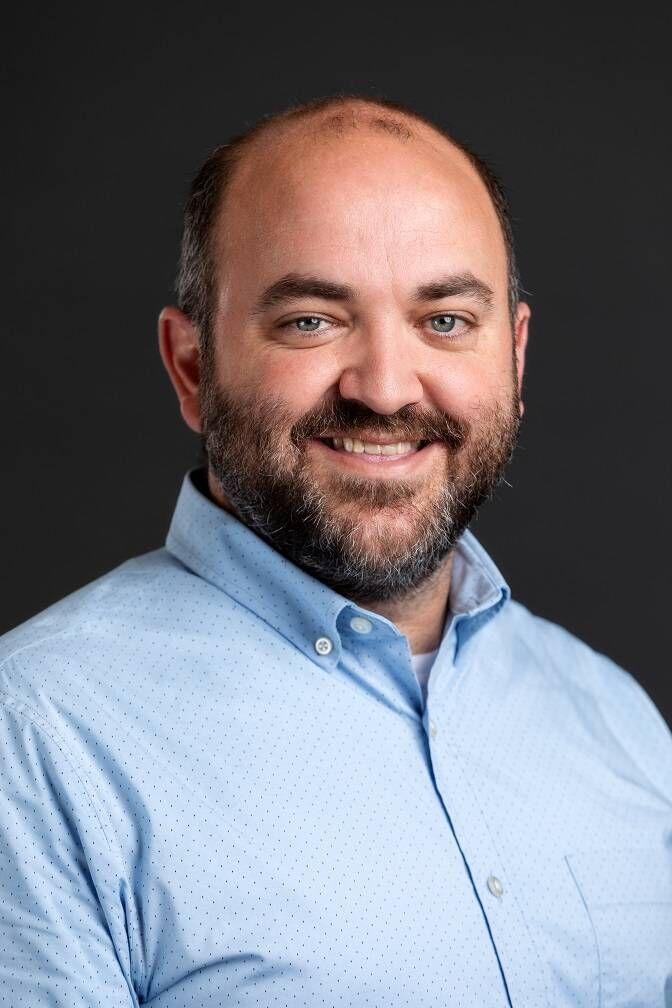The interim dean of the Manship School violated college policy and shut out faculty input at several turns in his push to lower admissions standards for the college, a Faculty Senate investigation concluded.
Josh Grimm, interim dean of the Manship School of Mass Communication, framed his plan as an effort to bolster diversity in the college. It would remove the preference for 3.0 GPAs, reduce credit hour requirements and admit high-achieving students straight from high school in an effort to recruit and retain students.
The Manship faculty passed the plan in September in a contentious 16-12 vote, but an investigation by the Faculty Senate Adjudication Committee says the vote should be thrown out and the process vetting the policy redone. The adjudication committee is made up of faculty and hears complaints alleging violations of policy and procedure; it does not rule on the merits of policies.
The committee found Grimm repeatedly strayed from faculty governance norms and policies. He dismissed faculty concerns over the plan, created a special committee against university bylaws and stacked with those who reported directly to him, and held a vote over the proposal that violated the college’s policy, the committee found.
The committee reported that it spoke with five members of the Manship School who witnessed relevant points in the process and compiled dozens of documents during its investigation.
A member of the adjudication committee, sociology professor Ed Shihadeh, said what happened at Manship was unlike anything he had seen in his 30 years at the university.
“I don’t know of a precedent like this that has ever happened,” Shihadeh said in an interview, noting that he is new to serving on this specific committee but has spent decades at LSU as faculty.
Grimm defended his handling of the admissions proposal in a rebuttal included in the adjudication committee report and in a statement Friday.
The proposal had split the Manship School faculty from the start. Members voiced concerns that lowering standards without increasing academic support would hurt students. Some said the plan implicitly reinforced negative stereotypes.
But it wasn’t the policy itself that launched the investigation: It was the process that preceded it. Two Manship faculty, professors Len Apcar and Jack Hamilton, wrote a scathing complaint in January that kick-started the review.
“The vote not only symbolizes a deeply-divided faculty but is the culmination of a process that was so rushed and biased that it crushed every tenet of faculty governance,” Apcar and Hamilton wrote in a letter addressed to Faculty Senate President Inessa Bazayev.
They felt a consensus resolution could have been reached among faculty had the interim dean acted differently.
“Our concern here is not the admissions policy or goals that the interim dean wished to achieve, but with the methods by which he did this,” they wrote in a March letter to the adjudication committee. “Had he worked toward a consensus, he could have avoided a divisive vote.”
If Manship’s policy not allowing absentee votes had been followed, Grimm’s plan would not have passed. The vote among those present at the virtual meeting last fall was 12 yes, 12 no and one abstention. A tie would mean the plan fails.
But Grimm said, after the vote of those on the Zoom call, there were four absentee votes in favor of the proposal. These votes, the adjudication committee found, were in violation of college policy, which does not allow absentee votes on policy matters.
The committee pointed to Manship’s policy, included in the handbook distributed to staff just a month before the vote: “Except for personnel matters specified in PS-36, all faculty voting shall be done in person or virtually. There shall be no proxy voting.”
Grimm rebutted this and “claimed that such absentee voting was widely known and was practiced extensively in the past,” the adjudication report read.
The committee rejected that claim. “The committee heard from several members who were not aware of this non-procedural voting practice, and at least one such faculty – who arrived about fifteen minutes late to the Zoom meeting – was denied a vote,” the report said.
The committee also couldn’t find any instance of absentee votes being used in the past for policy matters. And even if such votes had been allowed in the past, the committee reported, those would be in violation of the college’s policy, too.
Ultimately, the adjudication committee recommended in April that the college redo its vote and the process that preceded it—a charge it did not issue lightly.
“The [Faculty Senate Adjudication Committee] determined that such a recommendation could only be made if there were serious, recurring divergences from procedures when the vote was conducted and/or during the events leading up to that vote,” the committee wrote.
“The vote clearly did violate Manship’s own policy on voting,” Shihadeh said.
Grimm declined to be interviewed for this story and offered a statement instead.
“I respect the Adjudication Committee’s decision, though I was disappointed more context was not provided in the report,” he wrote in an email. “It’s unfortunate that faculty votes were suppressed due to an interpretation of a policy and procedure that have been in place for years, but I look forward to voting in favor of more inclusive admission policies as a faculty member.”
Grimm did not respond to follow-up questions asking for further elaboration on faculty votes being suppressed or the committee reporting it could not find instances of absentee votes being used for policy matters.
It’s a tense end to Grimm’s term. He became interim dean after Martin Johnson died in September 2020, and he will be replaced in July by permanent dean Kimberly Bissell, an administrator from the University of Alabama.
Changes to the admissions policy had long been on Grimm’s mind, with him raising the topic as early as an October 2021 faculty meeting, according to the adjudication committee.
He solicited feedback via email from the college’s Diversity Committee, composed of 10 faculty members, in March 2022, and he raised the proposal at two faculty meetings in April and May 2022.
Late that spring, Grimm established a five-person special committee to “assess admissions standards for the Manship School” and to “[create] a report that will include a range of recommendation in order to reflect the range of its findings.”
Grimm’s choice to fill two of those spots with staff members was “inconsistent with the LSU [Board of Supervisors’] bylaws,” the committee wrote.
“This is supposed to be faculty input, not staff,” Shihadeh said. He added that not only was the inclusion of staff a problem, but so was the appointment of two faculty members who were administrators “who reported directly to the dean.” The other member of the committee was an instructor.
“This committee is not really a broad spectrum of faculty input,” Shihadeh said.
But beyond that, the adjudication committee found the special committee should not have been established in the first place. The review should have been done by the standing Curriculum Committee, an established Manship faculty group tasked with reviewing admissions policies, the committee found.
Grimm also unilaterally rejected two of the special committee’s recommendations and put the others up to the faculty vote.
“Some faculty had the perception that there was no opportunity for further discussion and that alterations would be decided by Interim Dean Grimm alone,” the committee found. Grimm’s rebuttal included in the report said nothing stopped faculty from voting “no” on the plan he presented.
Grimm dismissed faculty concerns and stymied debate that could have led to a resolution, the committee found.
“It is clear from the testimony that certain faculty desired amendments to the proposal to be made and a discussion of their proposed changes considered, but these concerns were dismissed by Interim Dean Grimm,” the adjudication committee wrote. “Had a full and frank discussion of these possible changes occurred, a compromise might have been reached.”
For instance, according to the professors’ March letter, Apcar asked Grimm “that since a data study in the report showed that students with a GPA just below 3.0 were almost as likely to graduate as a student with a 3.5 GPA, would he consider admission language [that] made a priority of a 2.5 GPA instead of a 3.0.?”
“No, I cannot accept that,” Grimm said, according to the professors, who took this to mean “he would not consider amendments.”
This resistance to changes was also laid out in the adjudication committee report.
“While it can be argued that a formal amendment was never made, and one is not listed in the minutes of the August 17 meeting, it is clear from the testimony that Interim Dean Grimm wasn’t considering alterations to the committee’s recommendations that he didn’t agree with,” the committee found.
Though the adjudication committee found several problems with the way Grimm conducted the process, not all professors agreed with the complaints laid out by the adjudication committee.
Political communication professor Bob Mann, for one, said the Manship faculty talked about the plan “ad nauseam.”
“This was the longest debate on any policy that I’ve experienced in my 18 years [at Manship],” Mann said in an interview. “By a lot,” he added.
He said the Manship committee was not just people who supported the plan and wasn’t made “to just ram stuff through.”
“We’ve never considered anything with this amount of scrutiny,” Mann said, noting they spent almost a year talking about it and that “there were a lot of different points in the process where people were invited to become engaged with the proposal.”
To Mann, the policy would have officially solidified the holistic admissions process already used by the college. The 3.0 GPA listed on the application is only a preference, and the proposal would’ve eliminated that. Mann said on paper it looks like Manship has a “rigid, unyielding policy” when that’s not the case.
Mann also said the research he saw didn’t show a significant difference in the graduation rates of students with a 2.7 GPA and a 3.3 GPA. “I don’t think it’s been a real problem for us, and those students are graduating,” Mann said.
Instructor Roxanne Dill, on the other hand, said she “would have liked to have had a longer discussion about it” where “we just kind of threw it all on the table,” though she understands why some feel differently.
Dill said she felt everyone’s reactions to the process and proposal were rooted in care for students and their success. “Everybody wants students to have every opportunity they can,” she said.
At the direction of Provost Roy Haggerty, the findings of the committee were distributed to Manship faculty Friday in an email from Emily Hatfield, his chief assistant. The Office of Legal Affairs and General Counsel “determined that it is a public record and not confidential,” she said.
The move came two days after the report was provided to the Reveille in response to a public records request filed in May. Hatfield said in her email “individuals involved in the report have also agreed to its release.”
All current Manship parties mentioned in the report were contacted by the Reveille. All responded except professor Lance Porter, who did not respond to phone calls and an email.
To Shihadeh, the adjudication committee member, this report illustrates a taking back of governance rights by faculty at LSU who have felt their role diminish.
“This finding by the adjudication committee is probably one of the more significant assertions of the proper role of faculty in admissions and curriculum at LSU,” Shihadeh said.
If you are an LSU faculty member who has concerns about faculty governance or other issues in your college, reach out to the Reveille at editor@lsu.edu or on social media at @lsureveille. Any information you share will not be published without your consent.
Read the full report here:






